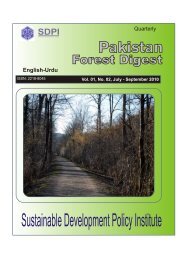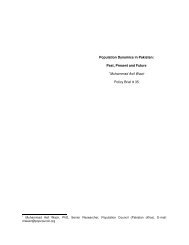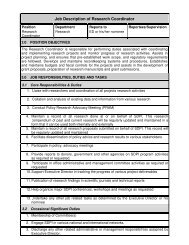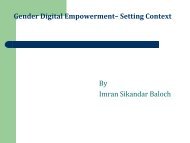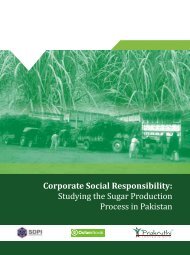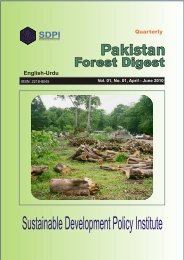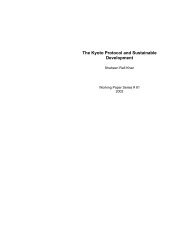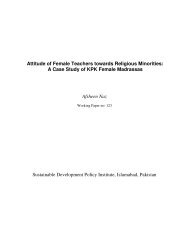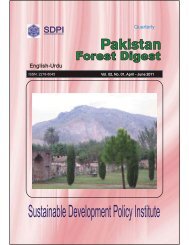Annual Report 2009-10 - Sustainable Development Policy Institute
Annual Report 2009-10 - Sustainable Development Policy Institute
Annual Report 2009-10 - Sustainable Development Policy Institute
- No tags were found...
Create successful ePaper yourself
Turn your PDF publications into a flip-book with our unique Google optimized e-Paper software.
of other ICTs by women and girls carries a negative stigma. Besides, the wide gender disparityin access to education forms an obstacle in using ICTs more generally. The negative perceptionswomen and girls have of their technological skills heighten these hurdles.While, so far, computers and internet access have hardly reached poor rural areas, if availablein the household, the gender gap in use of ICTs is widest in case of such computer equipment.The 'old' ICTs of radio and TV, on the other hand, combine the advantages of physical availabilityand comparatively easy access for females. Accessibility has a strong socio-cultural side to it.In case of broadcasting equipment, it implies, amongst others, that permission for use is largelynot required and that contents are understandable and attractive.These findings need to be kept in mind for the ongoing revision of the National IT <strong>Policy</strong> as wellas for public and private stakeholders' interventions for women's empowerment through ICTsmore generally. The current IT policy focuses on broad penetration with ICT-related infrastructureas the main path to make the potential of ICTs available for the development of rural Pakistan(IT & Telecommunications Division 2000). While encouraging special efforts to train andinduct women in the ICT sector, it does not refer to gender differences in access to and use ofICTs. The policy, therefore, implicitly assumes gender-neutral technologies.The present results contradict these assumptions. While the gender digital divide is wide in marginalisedareas of rural Pakistan, the findings reported above highlight that policies and interventionsaiming to use ICTs for human development need to go beyond the provision of technologicalhardware. Social norms have been identified as crucial factors determining women and girls'access to and use of ICTs. They need to be addressed if universal access to ICTs including ruralareas of the country is the Government of Pakistan's objective. Control over technology inthe form of ownership, mobility restrictions and other cultural constraints for females, such astheir difficulties in accessing schooling, have to be taken into consideration in ICTs for development.Based on the results presented above, broadcasting equipment apparently scores well in theseareas. Research across Asia (e.g. ISIS International 2007) and practitioners' experience haveshown how, for instance, radio programs can give a voice to women's concerns and can featurewomen as producers of media content in a male-dominated domain. Therefore, public and privateorganisations with the aim of promoting women's empowerment should not neglect 'old'ICTs such as radio and TV in their efforts to harness the potential of ICTs for greater genderequality. If public media bodies, such as the Pakistan Broadcasting Corporation or PakistanTelevision, or private electronic media join hands with non-governmental organisations, mediatools with a powerful reach to women and girls in rural areas can be developed. Existing localisedprograms should be extended to cover more languages and contents of special interest towomen.The discourse on development benefits of ICTs in Pakistan is currently dominated by an engineeringperspective. Progress in bridging the gender digital divide in Pakistan should be monitoredwith the support of gender-disaggregated IT indicators to be compiled by the Federal Bureauof Statistics, focusing on access and use, rather than technical infrastructure alone.Major challenges, such as the livelihood insecurity pervasive in rural Pakistan, the lack of physicalinfrastructure and facilities for education and health care, have to be addressed first, beforeICTs can prove beneficial for human development in rural Pakistan in general and for greatergender equality in particular.For further details contact Ms. Nazima Shaeen. nazima@sdpi.org<strong>Annual</strong> <strong>Report</strong><strong>2009</strong> - 20<strong>10</strong>29S u s t a I n a b l e D e v e l o p m e n t P o l I c y I n s t I t u t e



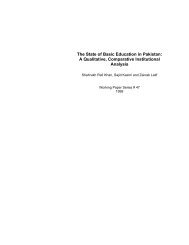
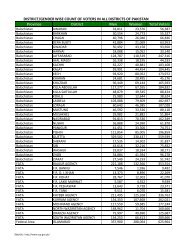
![(October - December, 2010) [13th SDC Special Bulletin]](https://img.yumpu.com/50118608/1/184x260/october-december-2010-13th-sdc-special-bulletin.jpg?quality=85)
